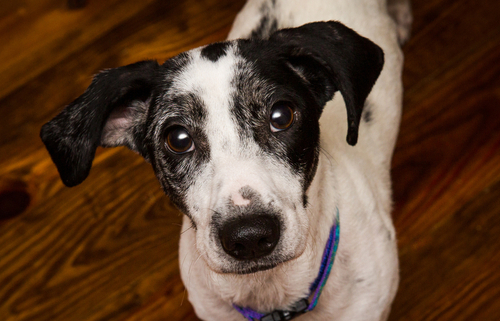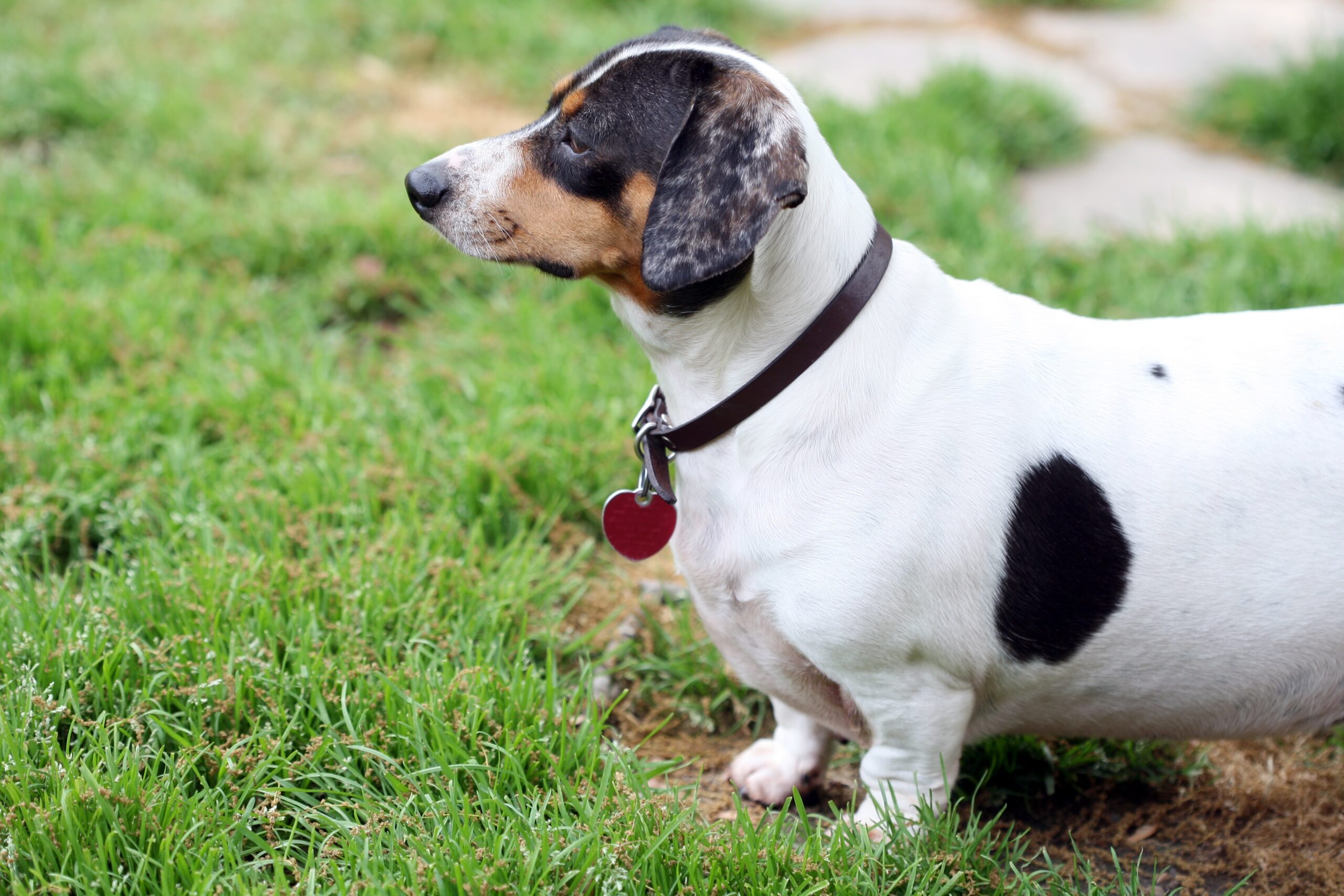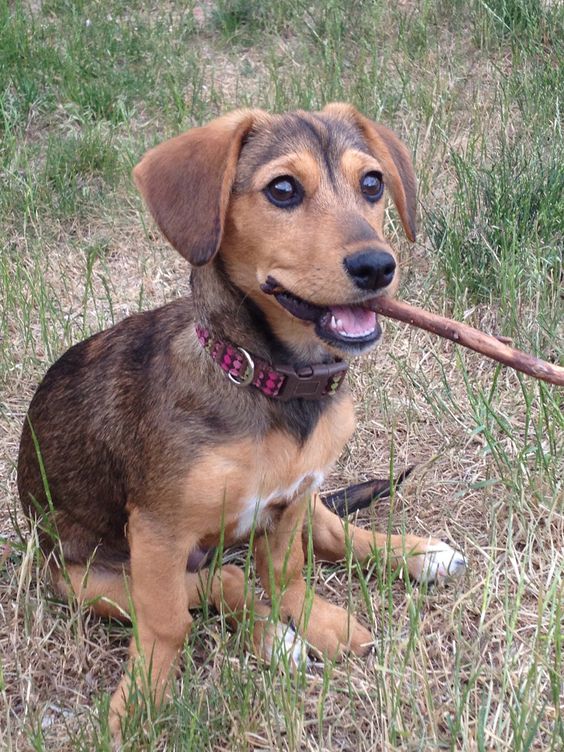Beagle Dachshund Mix: Doxle Breed Information
The Doxle has made its mark in the diverse world of dog breeds. It’s a cross between a Beagle and a Dachshund. This dog has the Beagle’s persistence and the Dachshund’s long body. Doxles are known for their friendly nature and can fit into various living spaces. They’re an excellent choice for experienced owners and newbies alike.
When looking into the Doxle, we consider their physical traits and how they behave. It’s interesting to think about how these characteristics affect their ability to adapt, learn, and stay healthy. Knowing more about their background and what it takes to care for them helps decide if a Doxle is the right dog for today’s lifestyles.
Key Takeaways
- Doxle mix: Beagle and Dachshund blend.
- Adaptable: Suits various home environments.
- Care needs: Understanding required for maintenance.
The Doxle stands out in the dog world. It’s a Beagle-Dachshund mix. This breed combines the Beagle’s tenacity with the Dachshund’s stretched frame. Known for their amiable demeanor, Doxles suit many homes. They’re ideal for both seasoned and first-time dog owners.
When assessing a Doxle, we look at physical and behavioral traits. These aspects influence their adaptability, learning capacity, and health. Learning about their care informs if a Doxle meshes with modern living.
Quick Facts
The Doxle is a unique mix of Beagle and Dachshund dogs. This mixed breed has a sturdy and compact body and wears a thick coat that can be found in several colors. It’s usually very alert and friendly.
Doxles fit well into apartment life as long as they’re given enough physical and mental activity. They’re not too sensitive and affectionate, making them great for families.
You can find them registered under names like Beaschund and Doxle in organizations that keep track of hybrid dogs, like the Designer Canine Registry.
Conducting a DNA test can tell a Doxle owner a lot about their pet’s health risks by revealing its genetic history.
Beagle and Dachshund Mix: Doxle Dog Breed Pictures






Overview
The Doxle, a cross between a Beagle and a Dachshund, is an excellent choice for a lively yet manageable pet. This designer dog combines the Beagle’s sharp sense of smell with the Dachshund’s courageous spirit.
Doxles are distinctive: they’re muscular with short legs and a long body, a nod to their Dachshund ancestry. Their size is perfect for smaller homes like apartments.
These dogs are not too sensitive and affectionate, fitting well into many home environments. They adapt quickly and are loyal, making them excellent family pets.
Key Traits

Derived from their Beagle and Dachshund ancestors, Doxles are known for their sturdy build and flexible nature. Thanks to their hunting heritage, these dogs have a strong instinct to chase. Doxles need plenty of activity to stay happy and healthy, reflecting their forebears’ active lifestyle.
Regarding their physical form, Doxles has a distinct look with a solid yet compact stature, featuring short legs, an elongated torso, and a thick coat. Their adaptability is impressive, managing well in smaller spaces like apartments if they get enough exercise. Health-wise, they tend to have ear issues that require regular cleaning to prevent infections and need a fair amount of grooming.
Observing the Doxle’s characteristics, they’re both vibrant and devoted companions. Proper care is vital for their well-being due to their distinct bodily features and inherited traits.
Origins of the Doxle Breed

The Doxle breed is a modern mixed breed dog from breeding the Beagle with the Dachshund. These two dogs have unique histories and characteristics that shape the Doxle’s looks and behavior.
To fully grasp what makes up a Doxle, we should look at the following:
- Breed Ancestry – we need to study the genetic heritage that the Beagle and Dachshund bring.
- Doxle Historical Context – we should trace when this mixed breed started to gain attention and when canine hybrid groups began to recognize it.
- Crossbreeding Purpose – it’s helpful to consider why breeders might cross these two dogs. They might want to bring out the best in both or reduce the risk of specific health problems.
Breed Ancestry
The Doxle is a mixed breed dog that comes from intentionally mating a Beagle from England with a Dachshund from Germany. These two breeds have a history of being skilled hunters, and their traits are evident in the Doxle. This hybrid is recognized by organizations like the Designer Breed Registry, which shows it’s a respected member of the designer dog world.
While we don’t know the exact year Doxles came to be, they are part of a trend where people breed dogs to get the best qualities of each parent breed. DNA tests have confirmed the Doxle’s Beagle and Dachshund heritage, which helps pinpoint health issues that could affect this breed.
Doxle Historical Context
The history of the Doxle breed starts with the deliberate crossbreeding of Beagles and Dachshunds. This mix was designed to merge the Beagle’s keen sense of smell with the Dachshund’s unique body shape and prey drive. The Doxle originated from Germany and England, the native countries of the Dachshunds and Beagles. Breeders aimed to create a dog that excelled in hunting and being a loyal companion.
The Doxle, also known as Beaschund or Doxle, is recognized by various hybrid dog organizations. Dog DNA tests can reveal the Doxle’s inherited traits, which helps predict their behavior and potential health issues. This information is helpful for both breeders and pet owners to set the right expectations and provide proper care for these dogs.
Crossbreeding Purpose
In creating the Doxle breed, breeders combined the Beagle’s outstanding sense of smell with the Dachshund’s iconic shape and hunting prowess. The goal was to produce a dog that excels in tracking and is a great companion.
The Doxle blends the Beagle’s top-notch scent-tracking skills, refined for hunting, and the Dachshund’s persistence and unique build, intended for chasing animals in caves.
The Doxle represents the intentional mix of breeds to create dogs with tailored traits that meet functional needs and the wish for a distinctive companion. The International Designer Canine Registry and the Canine Hybrid Club have acknowledged the Doxle.
This breed shows a successful effort to mix traits like trainability, flexibility, and devotion to fit the different lifestyles of owners.
Physical Dimensions

The Doxle dog’s physical characteristics are shaped by their mixed lineage, which is crucial in their overall health and adaptability to different living situations.
It’s helpful to know that:
- The size of Doxles places them in the medium dog category, which means they need enough room to move and a good amount of exercise to stay healthy.
- Their unique body structure, a trait from their Dachshund ancestors, makes it vital to look after their spinal health to avoid typical back issues.
- The coat of a Doxle can vary in length and thickness, influencing how much grooming they need and their comfort in various weather conditions.
Average Height Range
Doxles stand at a height of 9 to 11 inches from the ground to their shoulder. Their heritage is a blend of the Beagle and Dachshund breeds, which puts them in the small dog group. The Dachshund contributes to their elongated body shape, while the Beagle’s genetics provide a sturdier and well-proportioned frame. When looking at a Doxle puppy, these measurements indicate how big they will grow as adults.
The breed usually weighs between 20 and 30 pounds, which matches well with their height, resulting in a Doxle that looks strong and well-built. Anyone raising or breeding these dogs must watch these size metrics to ensure they stay healthy.
Weight Specifications
Doxles, a crossbreed of dachshunds and beagles, typically weigh between 20 to 30 pounds. Their weight is essential for their health, as they can quickly become overweight due to their genetics.
Owners should carefully monitor their diet to ensure it matches their energy needs, considering their age and how active they are. Regular vet check-ups, including weight assessments, are vital to catch any early weight gain.
It’s also essential to check their ears regularly, as they can be susceptible to infections.
Taking care of a Doxle’s dietary and health needs can help ensure their happiness and longevity.
Body Shape Features
Doxles have a unique body shape that combines the best of both their dachshund and beagle ancestors. They have a muscular build with short legs and a long body.
Their low-maintenance coat requires an occasional brush to remove loose hair, particularly when shedding.
Due to their mixed heritage, Doxles might chase smaller animals and should be trained and socialized early to prevent any problems.
Despite their distinctive shape, they’re energetic and can adapt well to different homes, making them great companions for many people.
Coat Length Variations
Doxles, known for their muscular build, showcase a variety of coat lengths due to their mixed heritage from Beagles and Dachshunds. Their coats can be either short and thick or have longer hairs, reflecting the breed’s diverse genetic strengths.
These dogs are created to blend the best features of both breeds. As a result, Doxles have coats that are easy to care for and require little grooming.
Organizations like the American Canine Hybrid Club and the Designer Dogs Kennel Club recognize Doxles for their intentional breeding and distinct features. Though not considered purebred by the Kennel Club, the Doxle’s coat comes from careful selection. The goal is to combine the Dachshund’s minimal shedding with the Beagle’s slightly longer coat.
This creates a coat that is not only easy to manage but also caters to the preferences of different dog owners.
Paw Size Comparison
When looking at Doxles, you’ll notice their paws are a mix of sizes. They land between the sturdy paws of Beagles and the smaller ones of Dachshunds. A Doxle’s height is usually between 9 and 11 inches, weighing about 20 to 30 pounds. Their paws are suitable for their size, giving them the support they need.
If you’re considering getting a Doxle, remember that paw size matters. It can affect how much exercise your dog will need. A dog’s paws can tell you a lot about their energy levels and how active they might be.
Behavioral Traits

Understanding a Doxle’s behavior requires paying attention to both their genetics and the environment they live in. When training and socializing this breed, a well-thought-out plan is vital. It’s essential to identify and manage certain behaviors using proven methods.
Here are the main points to focus on for Doxle’s behavior management:
- Apply consistent training to control their natural hunting instincts and prevent unwanted chasing behaviors.
- Socialize them effectively to help them get along with other animals and people, making them more outgoing and adaptable.
- Use training techniques that match their smartness and willingness to learn, ensuring they follow commands willingly.
Prey Drive Management
Managing a Doxle’s strong prey drive is essential to avoid unwanted behavior like chasing small animals. Doxles are intelligent dogs with a Beagle and Dachshund heritage, and they tend to bark and chase due to this.
They use training methods based on solid research to handle their prey drive. Starting socializing and obedience training early would help control their instincts. Give Doxles puzzle toys to keep their minds and bodies busy positively.
Also, it’s vital to keep practicing walking on a leash and coming when called. This ensures they stay safe and well-behaved during walks.
Socialization Techniques
Training a young Doxle to behave well involves starting early. Teaching them to handle their natural hunting instincts is vital. Encouraging friendly behavior using positive reinforcement is effective. Give them treats and compliments when they interact well with others.
They need to meet various people and animals. This includes kids, which helps them become gentle and friendly.
Introducing them to different places and situations helps Doxles adapt. They learn to be calm and outgoing. Regularly playing and interacting with them is crucial. It builds their confidence and ensures they’re good with other animals, even small ones.
Techniques like gradual exposure to fears and rewarding calm behavior help prevent aggression. This way, your Doxle can become a relaxed and friendly companion.
Obedience Training Tips
Starting obedience training for a Doxle puppy is crucial for shaping good adult behavior. Using treats and praise to reward good behavior is an effective training method because dogs respond well to positive feedback.
It’s essential to practice commands in different places so your Doxle can learn to follow them anywhere, which is good for their brain. Training should also include meeting new people and animals to prevent aggression later.
Good training tips remind us that dogs need to use their brains and get enough exercise to avoid problems. Watch your Doxle closely during training to ensure your methods work well since this breed is sensitive and needs a gentle trainer.
Separation Anxiety Solutions
To help Doxle dogs cope with separation anxiety, it’s essential to keep their minds active and stick to a regular schedule. This reduces their stress and stops them from acting out alone.
Interactive toys can distract them, keeping them busy and less worried when you’re not around.
Teaching your dog to be okay with you coming and going can also make a big difference. This is done by slowly getting them used to the idea that you will leave but also return.
For those Doxles with severe separation anxiety, getting a dog trainer might be the best step. They can work on changing the dog’s behavior in a structured way.
When you leave or come home, try to keep things low-key. A big fuss can make the dog think it’s a big deal when you’re not there, making their anxiety worse.
Behavioral Correction Methods
When training Doxles, it’s vital to use consistent positive reinforcement. These dogs respond well to rewards like treats and compliments, encouraging good behavior.
Since Doxles are full of energy and love to play, giving them plenty of exercise is essential. Daily trips to the dog park give them the physical and mental workout they need, which can help cut down on behavior problems.
Regular training sessions a few times daily can help keep a Doxle’s attention and strengthen their training.
And if you’re having trouble, don’t hesitate to get advice from a certified dog trainer. They can offer strategies just right for your dog’s unique personality.
Wellness Considerations
When considering the wellness of the Doxle breed, it is imperative to integrate a holistic approach that encompasses physical health, dietary needs, and behavioral aspects.
An evidence-based analysis suggests that:
- Health screenings are pivotal in the early detection and management of breed-specific ailments.
- A diet with a nutritional balance is critical to supporting their metabolism and maintaining optimal body condition.
- A consistent exercise routine fortifies their physical health and contributes significantly to their psychological well-being.
Health Screening Importance
Regular health exams are essential for spotting health problems early. This can lead to better outcomes because issues can be addressed quickly. For people over 50, yearly check-ups are vital because they can reveal issues like high blood pressure or high cholesterol. These are often warning signs for more serious problems down the line.
Even if you’re in good health, having these screenings is still a good idea. They keep track of vital signs like blood pressure and check for risks in the urinary system and other parts of the body. Healthcare providers use your personal and family health history to tailor these exams. This helps them foresee and handle any health problems, showing why these check-ups are vital to staying healthy for years.
Diet Nutritional Balance
Regular check-ups can catch health problems early, and keeping your dog’s diet balanced is just as critical. A dog’s well-being and preventing obesity and related illnesses depend on getting this right.
For designer dog breeds like the Doxle, their diet should have the right mix of proteins, carbs, fats, vitamins, and minerals. Puppies need food that supports their fast growth. On the other hand, adult dogs need a diet that keeps them healthy without too many calories.
To create a balanced diet for your dog, consider their size, activity, and any health issues they might have. Sometimes, supplements might be necessary to meet a dog’s specific health requirements. Always work with a vet to develop a feeding plan that meets your dog’s needs.
Exercise Routine Benefits
Regular exercise is vital for Doxles’ health. It provides better heart health stronger muscles, and helps them maintain a healthy weight.
Since Doxles tend to be lively, they generally need moderate to high activity. Regular physical activity also reduces stress, sharpens their minds, and keeps their mood steady.
A balanced exercise plan is crucial for your dog’s health. It should be carefully planned to avoid pushing them too hard while keeping them active enough to stay fit and avoid becoming overweight, a common problem for dogs that don’t get enough exercise.
Essential Doxle Maintenance Tips
Maintaining Doxle’s health involves several crucial steps tailored to their unique needs. A well-planned care routine ensures your Doxle stays healthy and happy. Here are the essentials:
- A thorough grooming routine is crucial in avoiding skin and coat problems. Regular brushing and the occasional bath will keep your Doxle looking and feeling great.
- Your Doxle’s diet should contain nutrients to match your active lifestyle. Choose a dog food rich in proteins and fats to give them the energy they need.
- Regular exercise is a must for a Doxle. It keeps their heart healthy and helps to avoid behavioral issues. Daily walks and playtime are perfect ways to keep them active.
Grooming Routine Essentials
To keep a Doxle’s coat healthy and looking its best, it’s vital to brush it regularly with a soft bristle brush and give it baths when needed with a gentle shampoo made for dogs. Known for their distinct coats, Doxles thrive with a grooming routine tailored to their needs, supporting their health. Introducing grooming to these dogs early on helps form a beneficial routine.
Encouraging their sharp minds with interactive toys is crucial to their mental growth. It’s also essential for these dogs to exercise enough to help prevent common health issues like intervertebral disc disease, which can affect this breed.
A comprehensive approach to Doxle’s grooming and overall care is crucial for keeping them in top shape.
Optimal Diet Practices
A balanced diet is critical for Doxles, who typically need between 1.5 and 2 cups of dry kibble daily. This amount should be adjusted based on their activity level and size. To prevent health issues like spinal problems and excess weight, which can increase veterinary costs, it’s important to customize their food according to their needs.
Proper nutrition helps prevent ear infections and other conditions common to the breed. At least an hour of exercise daily is vital, allowing Doxles to maintain a healthy weight.
Puppies younger than two months should gradually switch to adult dog food. Including the right supplements in their meals can also promote ongoing health.
Regular Exercise Regimens
For Doxle dogs, a consistent exercise plan is crucial. It keeps them at a healthy weight and helps prevent health issues like obesity and intervertebral disc disease. Experts recommend at least 30 minutes of daily exercise to keep these dogs happy and healthy.
Activities that suit their Beagle and Dachshund heritage, such as scent games and agility training, are perfect for them. A daily routine can help Doxle dogs avoid inherited health problems.
When the weather is very hot or cold, owners should adjust their dog’s exercise to keep them safe and healthy.
Health Monitoring Strategies
Building on the benefits of regular exercise for your Doxle, it’s critical to also have a strong health monitoring plan in place. Regular vet check-ups and staying on schedule with vaccinations are vital to your dog’s health. These check-ups are essential for catching any issues early on.
Keeping an eye on your Doxle’s weight and diet is essential, as this breed tends to gain weight quickly. A diet that balances nutrition and calorie use is vital. Pay close attention to your dog’s ear health, too, since their Dachshund heritage makes them prone to ear infections. Catching these early can stop them from getting worse.
Another health issue to watch for is intervertebral disc disease. This can cause back pain in Doxles, so be alert for any signs of discomfort. Getting your dog to the vet quickly can make a big difference. Taking care of your Doxle’s teeth is also necessary. Use dental chews or brush their teeth to keep gum disease at bay.
Following these steps can help your Doxle live a long and happy life. While no dog can live to 138, these methods can help your Doxle thrive for many years.
Behavioral Training Techniques
Positive techniques such as giving treats and praising verbally can be very effective when training Doxles. These dogs are intelligent and naturally want to please, which makes them respond well to positive reinforcement. It’s essential to train them properly to overcome breed-specific challenges.
Doxles are sensitive, so being consistent and patient is crucial to training them without causing stress. Starting socialization early is vital to help them become well-behaved pets. Keeping their mind active prevents them from becoming bored and acting out.
To reduce their barking, which often happens due to separation anxiety, it’s best to gradually get them used to being alone. This helps them stay calm when their owner isn’t around. With the right approach, an owner can have a peaceful life with a well-trained Doxle.
Nutritional Guidelines for Doxles
Crafting a diet for Doxles requires attention to nutrient composition to maintain their health and energy. Determining the correct number of calories for each dog based on size and exercise habits is essential to keep them from becoming overweight and unhealthy. We must also consider special dietary needs that cater to the breed’s unique requirements and any inherited health issues.
An optimal diet for a Doxle should include a mix of protein, carbs, fats, and essential vitamins and minerals. Calculating the proper daily calorie count for a Doxle involves looking at the dog’s weight, life stage, and how active they are. Special diets might be needed for those with allergies or to support joint health.
When planning what to feed a Doxle, a balanced diet with the proper nutrients is vital. This helps the dog stay fit and lively. For their well-being, it’s also essential to figure out how much food they need daily, considering how much they weigh, how old they are, and how much they move. Some dogs may need special diets, especially if they have specific breed-related health issues or allergies.
Optimal Diet Composition
To keep Doxles healthy and thriving, feeding them a balanced diet is essential. They should eat around 1.5-2 cups of high-quality dry food each day, tailored to their size and activity levels. Their diet needs to be carefully adjusted to meet their changing energy needs.
Doxles are great family pets and have been for many years. They require a diet that maintains their mixed-breed health and helps prevent common weight problems.
For Doxles, a regular feeding schedule and monitoring their weight is crucial. Adding supplements, such as omega-3 fatty acids, benefits their overall health. This is especially true for maintaining healthy joints, which is essential because of their genetic predisposition to joint issues.
Daily Caloric Requirements
Understanding Doxles’ daily caloric needs is critical to creating a diet that keeps them healthy and matches their energy levels.
Doxles are an excellent breed for people living in apartments because they fit well in small spaces and have a pleasant nature. But it’s critical to ensure they eat the right amount to avoid being overweight.
Puppy Doxles, who have lots of energy, should eat about 600 to 800 calories daily across several meals to help them grow properly. Grown-up Doxles need less—about 340 to 500 calories daily, split into two meals.
Keeping an eye on their weight and health is essential to adjust their food and ensure they get the correct number of calories for their activity.
Special Dietary Considerations
Doxles are a unique combination of dachshund and beagle traits, making them a popular designer dog breed. These dogs have specific dietary requirements to keep them healthy and active. A daily amount of 1.5-2 cups of dry food is usually ideal, considering their varying activity levels.
Supplements such as glucosamine and omega-3 fatty acids can be vital for maintaining joint health, as Doxles can be prone to back problems.
Despite their cute and cuddly looks, Doxles have the potential for a long and vigorous life when their diet is managed correctly. Proper nutrition and weight control are vital for their well-being. Working with a vet to create a diet tailored to your dog’s needs is advisable.
